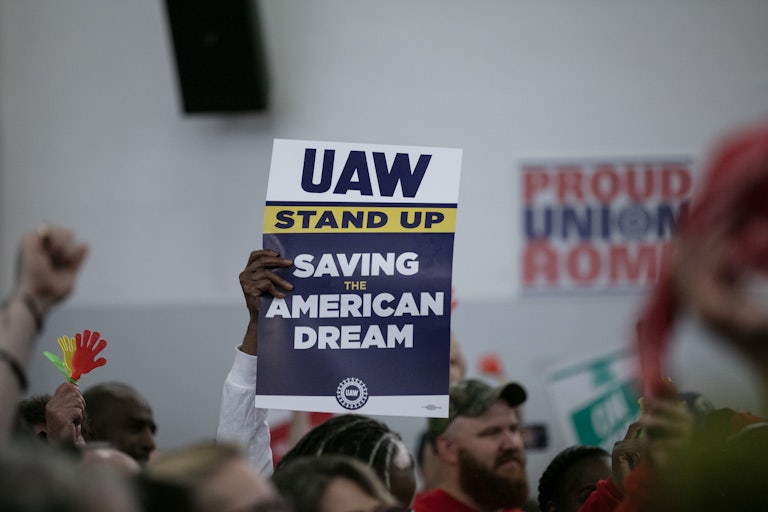Ford, UAW Deal Is a Lesson to Workers Everywhere: It’s Time To Unionize
The United Auto Workers secured a huge labor victory for its members.

Many of America’s autoworkers are about to see a massive bump in pay.
Ford Motor Company and the United Auto Workers reached a tentative agreement on Wednesday, smashing records with a historic contract that other autoworkers hope will start a radical shift in the industry. The labor victory is a huge win for the UAW—and shows what workers everywhere can achieve with the power of unions.
After a six-week strike, the two organizations have agreed to a staggering 25 percent base wage increase through April 2028, raising union members’ top wages to more than $40 an hour.
Starting salaries will also see a massive bump, growing by 68 percent over the term of the contract to more than $28 an hour. Meanwhile, the lowest-paid workers at Ford will receive an immediate 85 percent pay increase, with a raise of more than 150 percent over the lifetime of the agreement.
The union also finally recouped benefits that workers lost during the Great Recession, including a cost of living allowance that effectively bumps that 25 percent hike to a 33 percent raise, as well as a three-year wage progression (meaning workers can get pay bumps much more quickly). Retirement benefits were also improved, and in a first, the contract also permits union workers the right to strike over future plant closures.
Altogether, the deal will increase union members’ wages more in the next four years than they have in the previous two decades, according to data from the union.
“We won things nobody thought possible,” said UAW President Shawn Fain. “Since the strike began, Ford put 50 percent more on the table than when we walked out. This agreement sets us on a new path to make things right at Ford, at the Big Three, and across the auto industry.”
The eyebrow-raising agreement adds pressure on General Motors and Stellantis, where UAW workers are continuing to strike. So far, Stellantis has temporarily laid off more than 2,000 workers since some 7,000 union members began their strike at the Sterling Heights Assembly Plant on Monday.
“It’s usually a domino effect, you know, for the most part. We want to stay optimistic that if they can do it, then we could reach something tentative,” striking employee Sheu Shea Anderson told ABC Channel 7 Detroit.
Both companies have released statements saying that they are working to secure agreements “as soon as possible.”








